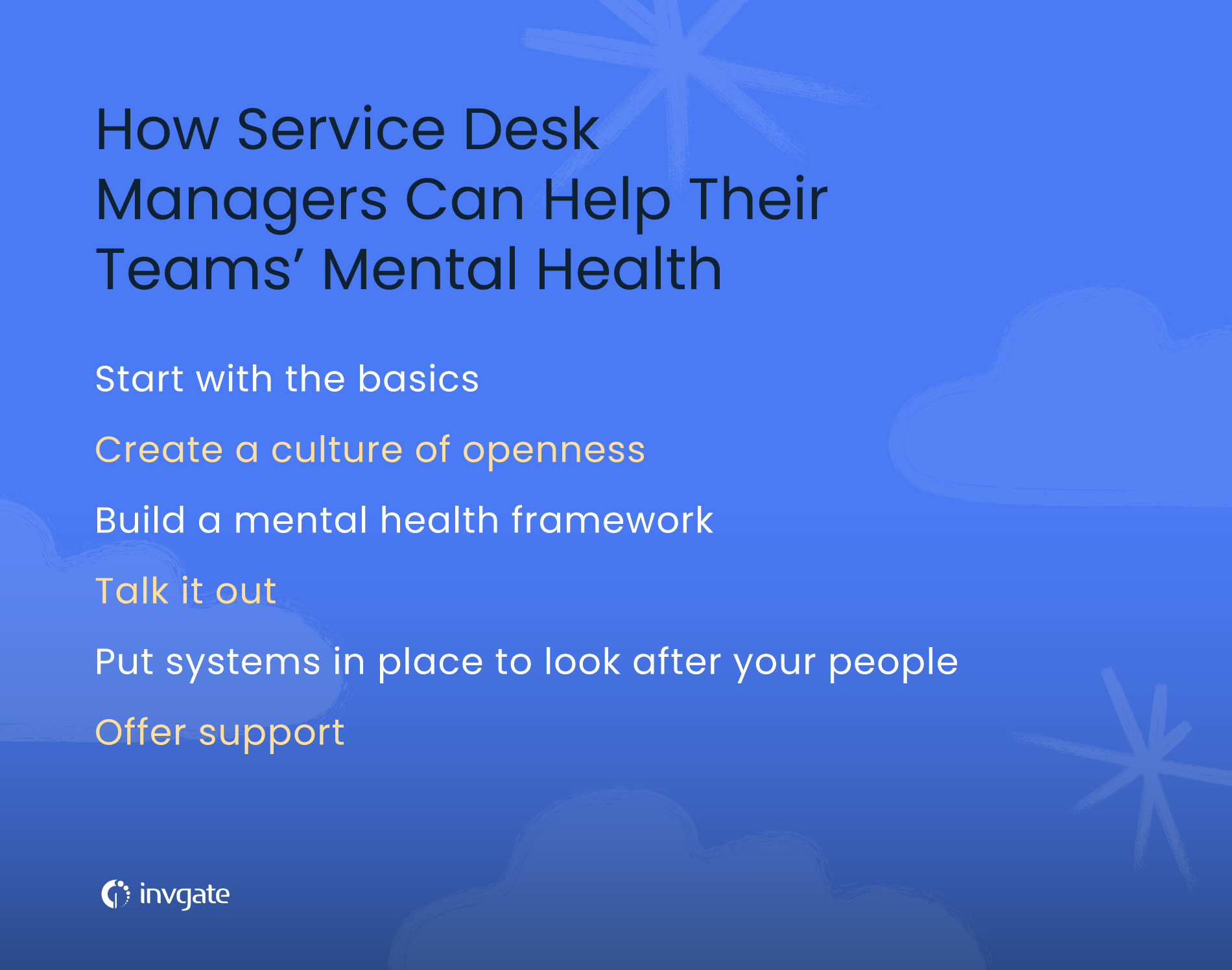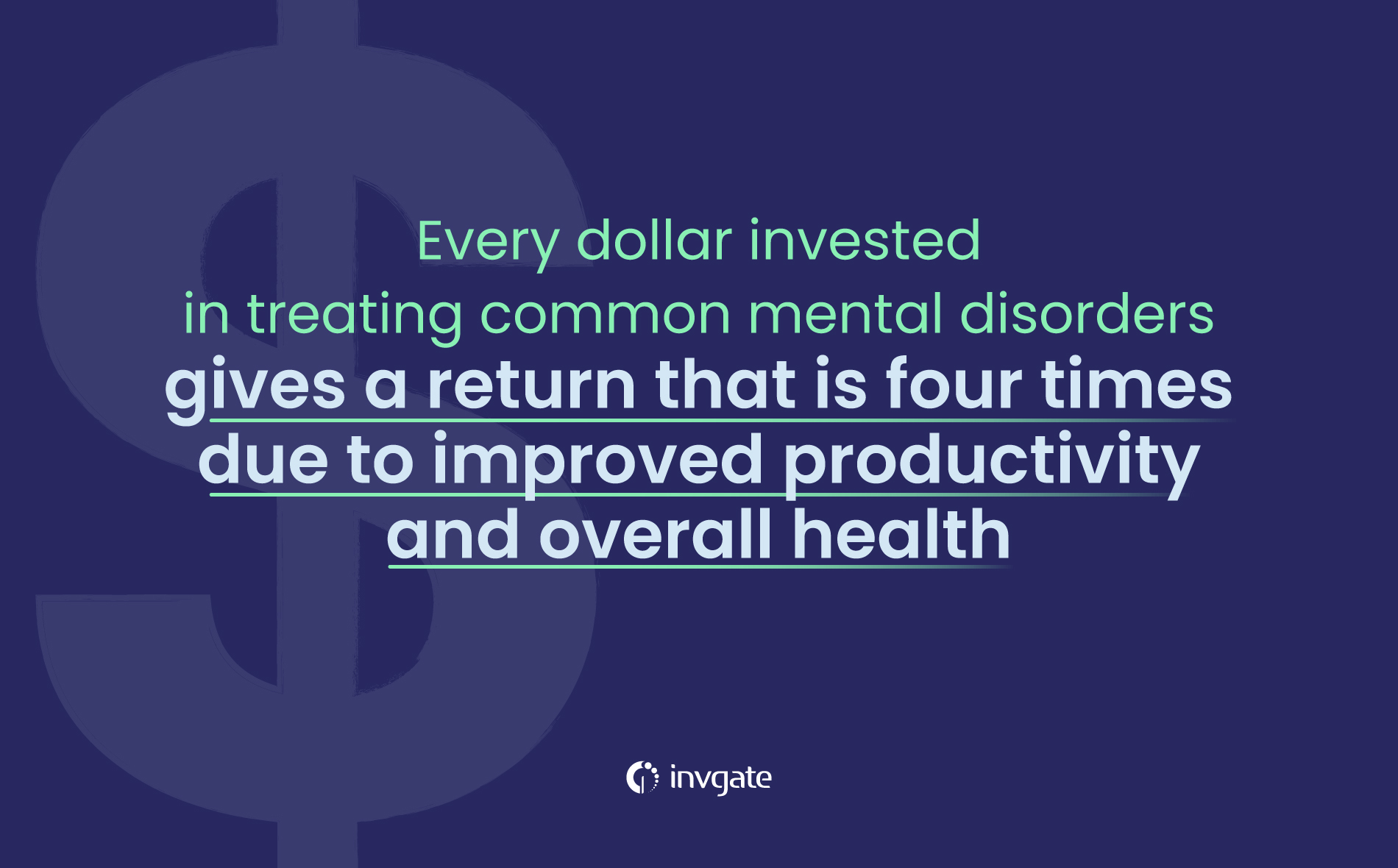The COVID-19 crisis has changed the way we live and work forever. It’s been a rough few years and one of the things that we’re still not sure of is its full impact on mental health.
So many IT professionals went to extreme and heroic lengths to keep systems up and running during the pandemic. Long hours became the norm, and with so many of us working from home, the line between work and home life became blurred; and the fact of the matter is that the working practices that worked during the pandemic simply aren’t sustainable anymore. If we continue to work this way, and don’t proactively look after our employees and colleagues, they will burn out.
We already explored ways to improve help desk agents' productivity by avoiding burnout. Not, it's time to inspect the link between mental health and the service desk, and give help desk managers some tools to better support their people.

Start with the basics
Do you have enough people? Honestly? Now is the time to take a look at your shift patterns and make sure you have enough agents to cope with the current set of demands. If your teams are working flat out, 100% of the time, then the chances are there’s too much work and not enough people. This will be helpful both to decrease your agents' workload and avoid the "knowledge hero."
Look at staffing levels and make sure you have the right people and set up. Another thing to do is make sure everyone is taking their breaks. It’s very tempting to skip breaks or eat lunch at your desk in an attempt to make a dent in the workload but if your people aren’t well rested, they’ll burn out.
Create a culture of openness
One of the hardest things about struggling with poor mental health is the feeling that no one will understand or will want to help. Depression, in particular, is a liar. It tells you that you’re not worth bothering about or that no one will want to help you. Lies, obviously, but if you’ve ever struggled with depression, it’s probably something that will sound all too familiar.
What do we do? We change the narrative. We talk about mental health and the service desk. Ask questions. Soft skills are not only relevant to communicate with stakeholders or other parts of the organization. They're crucial to improve your teams' relationships. So, make your workplace a safe space to talk about scary feelings.
Build a mental health framework
Make it clear that mental health is a priority in your organization by creating a formal support framework. Things to include are:
- A policy to cover mental health and wellbeing. This will ensure people are treated consistently and fairly as well as providing guidance to team leaders and managers.
- Training courses. Encourage your team to attend webinars or online courses to increase awareness and make it easier to spot someone who may be suffering in silence.
- Signposting for further help. Some useful resources include the MIND BLURT and AWARE websites.
- The contact details for your employee assistance plan, if your company offers one. Make sure you have the contact details to hand because trust us if someone is really struggling, the last thing they’ll want to do is go hunting for the link or log on information.
- A plan to help a colleague in a crisis.
It’s good to talk
Sometimes a really good chat with a friend or colleague can make all the difference. Sometimes scripts can be useful, so here’s some to get started:
If you notice a colleague who may be struggling:
- "I’ve noticed that you’re not your usual self recently. Are you OK?"
- "Hey - it’s been a while since we’ve talked about something other than the fact that the whole world seems to be on fire. How are you doing? What’s new in your world?"
If you’re the colleague that’s struggling:
- "Can we grab a coffee sometime soon? I’m having a bit of a tough time and it would be really great to catch up."
- "I feel really down and it’s scaring me."
- "I’ve been struggling with depression and I’m scared I’m not going to be able to keep myself safe. Can you help me to get some help?"
Put systems in place to look after your people
We have monitoring for critical IT systems, so why don’t we take care of our coworkers in the same way? Ok, we can’t attach an event management console to a person, but what we can do is build in some ways of working that takes care of our people.

Some ideas are:
- Wellbeing guardians or mental health first aiders. Ask people to progress the wellbeing agenda and work with managers to ensure they get the time needed to do this
- A buddy system. Having a support system in place so that people have someone to talk to if it all gets too much
- Coffee and chats. Build time into the working day so people can take some time to talk about the fun stuff. These can be virtual too!
Offer support
First and foremost, be there for your colleagues. Make sure your team knows that you’re available to talk to, even if it’s just listening to people vent. Think of them as ‘power rants’! Things are busy and stressful at the moment and having someone who’s understanding to talk to can be a real lifesaver. The only way we’ll come out of this relatively unscathed is if we look after ourselves and each other.

